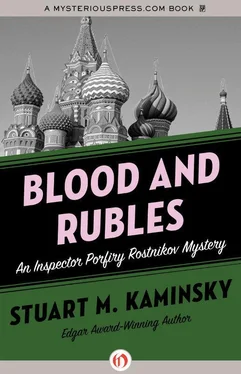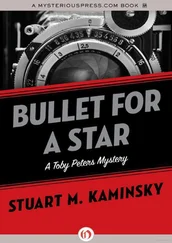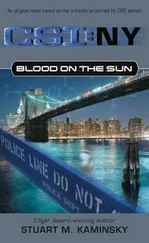Stuart Kaminsky - Blood and Rubles
Здесь есть возможность читать онлайн «Stuart Kaminsky - Blood and Rubles» весь текст электронной книги совершенно бесплатно (целиком полную версию без сокращений). В некоторых случаях можно слушать аудио, скачать через торрент в формате fb2 и присутствует краткое содержание. Год выпуска: 2012, Жанр: Полицейский детектив, на английском языке. Описание произведения, (предисловие) а так же отзывы посетителей доступны на портале библиотеки ЛибКат.
- Название:Blood and Rubles
- Автор:
- Жанр:
- Год:2012
- ISBN:нет данных
- Рейтинг книги:3 / 5. Голосов: 1
-
Избранное:Добавить в избранное
- Отзывы:
-
Ваша оценка:
- 60
- 1
- 2
- 3
- 4
- 5
Blood and Rubles: краткое содержание, описание и аннотация
Предлагаем к чтению аннотацию, описание, краткое содержание или предисловие (зависит от того, что написал сам автор книги «Blood and Rubles»). Если вы не нашли необходимую информацию о книге — напишите в комментариях, мы постараемся отыскать её.
Blood and Rubles — читать онлайн бесплатно полную книгу (весь текст) целиком
Ниже представлен текст книги, разбитый по страницам. Система сохранения места последней прочитанной страницы, позволяет с удобством читать онлайн бесплатно книгу «Blood and Rubles», без необходимости каждый раз заново искать на чём Вы остановились. Поставьте закладку, и сможете в любой момент перейти на страницу, на которой закончили чтение.
Интервал:
Закладка:
Elvira Chazova wailed. The wail echoed off the walls of the interrogation room, which were badly in need of paint. The wail woke the baby in her arms, who began to cry.
Zelach fought the urge to cradle his head in his hands. His eyes met those of the lawyer.
“How can you be sure?” said the lawyer.
“I saw them standing over him. There were no others on the street. Sash … the fallen officer told me it was they who attacked him.”
Lermonov sighed patiently and spoke over the crying and wailing.
“He was struck down from behind. He saw a trio of small boys armed with sticks and stones, small boys who had driven off his attackers. Heroes. They should get medals.”
“They did it,” Zelach repeated. “And they have done it before.”
“The court will not agree,” said Lermonov, rising. “I demand that you release the children into the custody of their mother. They are her sole support.”
“No,” Zelach repeated.
“You will lose your job over this,” said Lermonov, pointing a finger at the weary and confused detective.
“I am tired. I have a report to write and I don’t want to talk to you anymore,” said Zelach, unable now to keep his hand from moving to his throbbing forehead.
“This is-” Lermonov started but was cut off by Zelach, who suddenly rose, his chair falling backward to the floor.
“Out,” he said. “Now. Both of you.”
“Nazi,” shouted Elvira Chazova. “Communist. Dog.”
“Out,” Zelach repeated, starting to move around the table.
Lermonov grabbed Elvira Chazova’s arm and led her to the door as Zelach slouched forward. The baby screamed. Elvira Chazova pointed back at Zelach and cursed him. Lermonov said something, but Zelach couldn’t understand him. And then they were gone. Zelach’s headache was still there, but his tormentors were no longer in his face. He waited a few minutes before he left the room in search of an aspirin.
Natalya Dokorova sat with her hands folded, a large shopping bag at her side, listening to the explanation of the woman in the suit who told her that there was no appeal beyond this office. The treasure her brother had accumulated would not be returned, and she would almost certainly receive compensation only in the form of an increase in her pension.
Natalya bewailed her fate and the evil being done to her brother’s life’s work, but the young woman behind the desk was unmoved.
“You may leave, Natalya Dokorova,” the woman said. “When there is anything else, we will tell you.”
Natalya rose, tired from her efforts, sure that she had lost. She picked up her shopping bag and said a silent “Thank God” as she went out the door. In four days she would be in Germany. A day later she would be in England. She had prepared for this day even before the death of her brother. She had removed a number of items from the treasure room-only things that could fit into her shopping bag-and she had moved them to the apartment of her cousin, who considered the items a clutter of junk.
For one of the things she carried in her shopping bag at the very moment an English dealer in rare objects had offered a small fortune. Natalya had contacted the man when he visited Moscow earlier this year. The man had expressed, with the help of a translator, his awareness that many valued items had been unearthed in the Ukraine, Estonia, and Russia, objects the Americans, Arabs, and Japanese would pay much for.
The manuscript in her shopping bag was, the man from London had said, probably the most valuable of all. She had left it in sight of her cousin after carefully creating a new cover page. The cover of the manuscript now read “The History of the Kardovs by Natalya Dokorova,” a page that was certain to turn even the most curious examiner away.
The real cover page was buried in the many pages of manuscript that her brother had purchased from a woman who claimed that her mother had worked for the great Gogol just before his death. The woman’s mother had told her that Gogol had thrown the manuscript into the fire just days before his death and had walked out of the room. The woman’s mother had reached into the fire and rescued the manuscript. It had been singed slightly, but the woman had reasoned that something by Gogol might have some value. The woman had sold the manuscript to old Dokorov for the cost of a new wardrobe for her daughter.
Dokorov knew he had the real thing, but he had verified it by showing a single page of the manuscript to a professor of literature at Moscow State University. Dokorov had paid the man and told him it was the only page he had. The man had immediately pronounced it authentic.
“Do you realize what you have here?” the professor had said.
“No,” Ivan had replied.
“The only remaining page of the manuscript for Gogol’s sequel to Dead Souls. What do you plan to do with it?”
“Cherish it,” Ivan had said. “My love of literature is greater than my love of life.”
There were other items too-a small, almost priceless Chinese jar, which Natalya had filled with very cheap perfume, as she had its equally valued companion jar, which she would now retrieve if only the police had not found it. But the prize that she would present to the dealer in London was a slightly more-than-life-size jeweled Faberge egg in which nestled a perfect miniature carousel that spun in a gentle circle when wound with a tiny key. She had sealed the lid of the egg with paste that could easily be removed and she had taken a sticker from the Dom Toy Shop and placed it on the egg. There were other items, too, just as well disguised.
Though she was a strong woman, the weight of her bag and the trials of the day had slowed her down by the time she reached her front door. The policewoman stood waiting.
“Let me help you,” Elena said, taking the shopping bag from Natalya. “Can we speak? Just for a moment?”
Natalya nodded her head yes, exaggerating a tiredness she definitely did feel.
The house was almost bare now. Almost every item that might be worth something had been removed. There were now three wooden chairs and a small table painted green in the kitchen.
Elena followed the old woman and placed the bag on the table.
“Some tea?” Natalya said, sagging onto one of the chairs.
Elena pulled one of the other chairs forward and placed it directly before the woman. Then she sat and took one of Natalya’s hands in hers.
“I am sorry, Natalya Dokorova,” Elena said sincerely. “I told you I would help you and …”
Elena looked around.
Natalya put her free hand on the young woman’s shoulder.
“It will be all right,” the old woman said. “Come.”
She rose, and Elena followed her to the small bathroom, where Natalya turned on the light. Toilet. Sink. Tiny tub. Medicine cabinet. Natalya opened the cabinet, reaching past the tube of Crest toothpaste to a small bottle nestled among a quintet of other small bottles.
“I would like you to have this,” said Natalya.
“Thank you,” said Elena with a smile.
“Don’t worry too much. I shall be fine. But I must rest now.”
Natalya walked Elena to the front door and opened it.
“Thank you for stopping by,” said the old woman. “It was kind of you.”
“And thank you for the gift,” Elena said, stepping into the street. She looked down at the bottle in her hand. It was definitely Oriental, decorated with exquisite tiny flowers in a garden. The colors were vivid. Elena opened the top of the jar and smelled the cheap perfume. When she got back to Petrovka, she would empty the bottle, rinse it, and keep it on her desk as a paperweight.
In a rather odd way Anna Porvinovich reminded Porfiry Petrovich of Colonel Snitkonoy.
He watched her cross the room in her somber black knit dress. Her dark hair was brushed back, and not a hair was out of place. Her earrings were simple black onyx. She walked as if she were in some old movie-slowly, pensively, erect. She stood before him and allowed herself to be examined. She wore a knowing, worried smile.
Читать дальшеИнтервал:
Закладка:
Похожие книги на «Blood and Rubles»
Представляем Вашему вниманию похожие книги на «Blood and Rubles» списком для выбора. Мы отобрали схожую по названию и смыслу литературу в надежде предоставить читателям больше вариантов отыскать новые, интересные, ещё непрочитанные произведения.
Обсуждение, отзывы о книге «Blood and Rubles» и просто собственные мнения читателей. Оставьте ваши комментарии, напишите, что Вы думаете о произведении, его смысле или главных героях. Укажите что конкретно понравилось, а что нет, и почему Вы так считаете.












